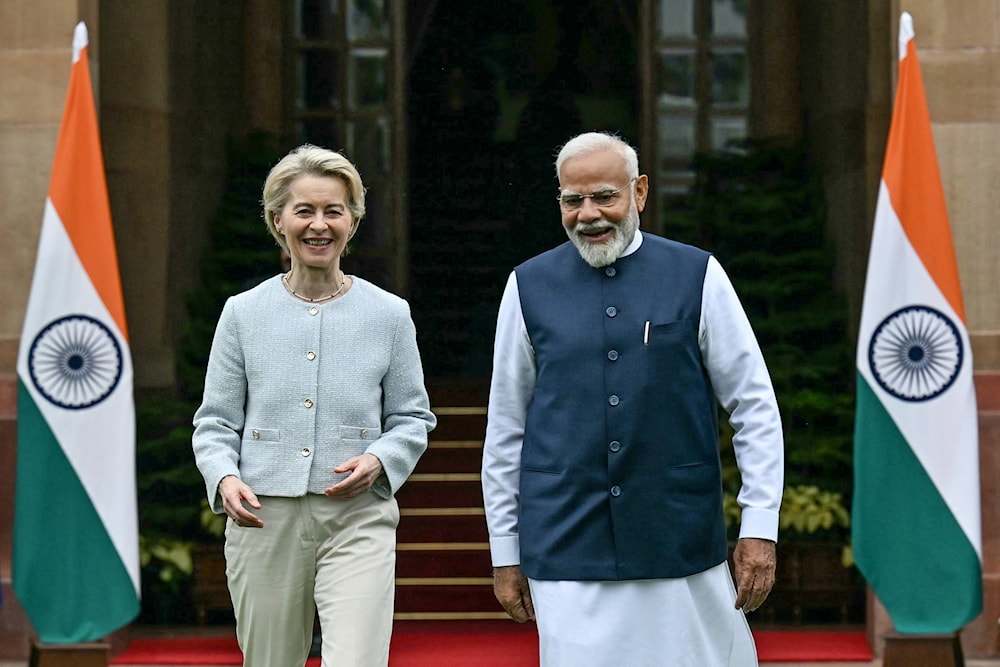India, EU agree to conclude free trade deal by year-end
The EU remains India's largest trading partner in goods, with bilateral trade surging nearly 90% over the past decade to reach $137.5 billion in the 2023/24 fiscal year.
-

European Commission President Ursula von der Leyen (L) speaks with India's Prime Minister Narendra Modi before their meeting at the Hyderabad House in New Delhi on February 28, 2025 (AFP)
India and the European Union agreed on Friday to finalize a free trade agreement by the end of the year, marking their first commitment to a deadline after years of negotiations amid aims to mitigate the impact of US tariff hikes.
The announcement was made during a joint press conference by European Commission President Ursula von der Leyen, who was on a two-day visit to India, and Indian Prime Minister Narendra Modi.
Both sides have long sought to establish a free trade pact, which would require India—one of the world’s most protected markets—to make significant concessions.
India and the European Union resumed negotiations on a long-pending free trade agreement in 2021 and are set to hold another round of talks in March. Additionally, an India-EU summit is scheduled for later this year.
"We have prepared a blueprint for collaboration in the areas of trade, technology, investment, innovation, green growth, security, skilling and mobility," Modi stated, adding that officials have been instructed to conclude the deal by year-end.
The EU remains India's largest trading partner in goods, with bilateral trade surging nearly 90% over the past decade to reach $137.5 billion in the 2023/24 fiscal year.
Von der Leyen emphasized the need for an "ambitious" trade and investment agreement, encompassing sectors such as batteries, pharmaceuticals, semiconductors, clean hydrogen, and defense.
"I am well aware it will not be easy. But I also know that timing and determination counts," she indicated, highlighting that such an agreement would be the largest deal of this kind anywhere in the world.
Additionally, von der Leyen stated that both sides are working toward renewed cooperation on security and stability and are exploring the possibility of a "Security and Defence Partnership" with India, similar to the EU’s existing agreements with Japan and South Korea.
Her visit, accompanied by EU leaders, comes amid escalating geopolitical tensions and as US President Donald Trump has threatened to impose reciprocal tariffs on all nations, including the EU and India, by April.
Brussels is keen to strengthen its presence in the Indo-Pacific, particularly as tensions between the US and Europe escalate over trade tariffs and Ukraine following Donald Trump’s return to the White House.
Trump has announced plans to impose 25% tariffs on goods produced in the European Union, alleging that the bloc was established to "screw the US." In response, the EU vowed to retaliate "firmly and immediately" against any unjustified tariffs.
Progress on the deal had been stalled for years due to India's reluctance to reduce tariffs in key sectors, while the EU hesitated to ease visa restrictions on Indian professionals.
The EU is pressing India to lower tariffs exceeding 100% on imported cars, whiskey, and wine, while India seeks greater access for its pharmaceutical and chemical industries in the European market.
Additionally, New Delhi is pushing for reduced tariffs on its exports of textiles, garments, and leather products and opposes an EU plan to impose tariffs of 20% to 35% on high-carbon goods—including steel, aluminum, and cement—from January 2026.
After years of hesitancy toward free trade agreements, India has increasingly engaged in trade negotiations with multiple countries and economic blocs.
This week, India and the UK resumed free trade talks, nearly a year after negotiations were paused ahead of general elections in both countries.
In 2023, India signed a $100 billion free trade agreement with the European Free Trade Association (EFTA)—comprising four non-EU European nations—following nearly 16 years of negotiations.
Read more: Musk's DOGE USAID claims spark controversy in India

 4 Min Read
4 Min Read










